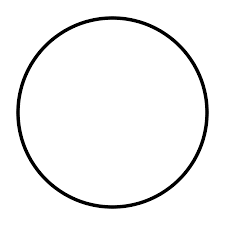CENTER OF A CIRCLE
CENTER OF A CIRCLE
Mathematics is a branch of science, which deals with numbers
and their operations. It involves calculation, computation, solving of problems
etc. Its dictionary meaning states that, ‘Mathematics is the science of numbers
and space’ or ‘Mathematics is the science of measurement, quantity and
magnitude’. It is exact, precise, systematic and a logical subject.
CENTER
In geometry, a center of an object is a point in some sense
in the middle of an object. According to the specific definition of center
taken into consideration, an object might have no center if geometry is
regarded as the study of isometry groups then a center is a fixed point of all
the isometries which move the object onto itself.
CIRCLE
A circle is the set of all points in a plane equidistant to a
given point in that plane. All circles have a center and a radius. The diameter
is twice the radius. All diameters of the same circle must have the same
length.
A circle has many
parts and properties.
Center: The center of a circle is defined as the point in the
middle of the circle. The points that make up the curve that is the circle are
all equidistant from the center point.
Radius: The radius is the distance from the center point to
the circle, this distance is always equal in a circle. When working with the
radius in geometry it is often denoted by r.
Diameter: The diameter is the distance from one side of the
circle to the other side of the circle which passing through the center. The
distance is twice the radius. When working with the radius in geometry it is
often denoted by d.
Circumference: The circumference of a circle is the distance
of the line that makes up the circle. Circumference is denoted by C and can be
calculated using the formula: C = 2πr
Chord: A chord is a line segment that links ant two points on
a circle.
Method 1
Step 1: Draw a chord across the circle.
Draw a line across the circle near the edge so it cuts the
circumference in two places. This is called a chord.
Step 2: Draw the perpendicular bisector.
Draw a line perpendicular to the chord which bisects the
chord.
Step 3: Repeat step 2 for another chord.
This should be enough to find the center of the circle, but
we can add more if needed.
Step 4: Use more chords for accuracy.
Method 2
Step 1: Draw two straight, intersecting tangent lines onto the circle.
Step 2: Translate both of the lines to the other side of the circle.
You will end up with four tangent lines forming a
parallelogram or a rough rectangle.
Step 3: Draw the diagonals of the parallelogram.
The point where these diagonal lines intersect is the circles
center. The center should be on target as long as we didn’t slip while
translating the lines or when drawing the diagonals.
From method 1 we can say that the perpendicular bisector of the line joining any two points on a circle passes through the center of the circle, or we can say that 'the perpendicular bisector of any chord of a circle passes through its center'.
Now if we just have a part of a circle can't we find the center and thereby complete the full circle?
Just draw two chords inside the piece and draw their perpendicular bisectors. Then we will get the center of the part of a circle and we can complete the circle. Using this we can find the center of any circle.
To teach this concept in class room we can say that use a bangle or a small round lid to draw a circle in their notebook and ask how do we find its center.Then the students will think about the concept, center of a circle. By dividing the class in to different groups and ask the students to find the solution.This will make the class more interesting and they will not forget the concept.
From method 1 we can say that the perpendicular bisector of the line joining any two points on a circle passes through the center of the circle, or we can say that 'the perpendicular bisector of any chord of a circle passes through its center'.
Now if we just have a part of a circle can't we find the center and thereby complete the full circle?
Just draw two chords inside the piece and draw their perpendicular bisectors. Then we will get the center of the part of a circle and we can complete the circle. Using this we can find the center of any circle.
To teach this concept in class room we can say that use a bangle or a small round lid to draw a circle in their notebook and ask how do we find its center.Then the students will think about the concept, center of a circle. By dividing the class in to different groups and ask the students to find the solution.This will make the class more interesting and they will not forget the concept.





Comments
Post a Comment